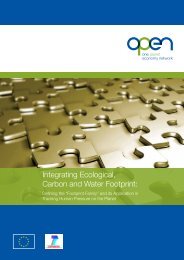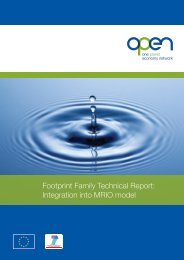OPEN: EU Scenario Storylines Report: - One Planet Economy Network
OPEN: EU Scenario Storylines Report: - One Planet Economy Network
OPEN: EU Scenario Storylines Report: - One Planet Economy Network
Create successful ePaper yourself
Turn your PDF publications into a flip-book with our unique Google optimized e-Paper software.
agricultural activities, CAP payments for organic production favour multi-story indoor<br />
organic farming facilities powered by renewable energy and utilising sustainable<br />
techniques. These facilities allow for more efficient year-round supplies of fresh, organic<br />
and locally grown food. Additionally, CAP payments for ecosystem services also favour<br />
ecosystem preservation and land stewardship. Demand for animal-based products is low.<br />
Consequently, in many areas, farmland formerly used for animal fodder or for grazing<br />
has been returned to nature and has resulted in the restoration of the natural functions<br />
and services of the ecosystem and increased biodiversity.<br />
<strong>EU</strong>ROPE’S POLICY MIX TO A ONE PLANET ECONOMY BY 2050<br />
Broad economic policies<br />
� New tools for measuring progress. With social good and quality of life valued<br />
over profit making, Europe has made a concerted effort to move beyond GDP. The<br />
use of <strong>One</strong> <strong>Planet</strong> <strong>Economy</strong> environmental indicators for monitoring development<br />
progress was established by 2015. Corporate accounting requirements have<br />
ensured that businesses make visible and account for not just financial value, but<br />
also the environmental and social performance of the company (i.e. triple bottom<br />
line reporting is mandatory, with penalties for noncompliance).<br />
� Environmental pricing reform. An <strong>EU</strong>-wide initiative to coordinate price signals<br />
resulted in increased prices for energy, raw materials and materials with high<br />
environmental impacts, both per unit of use and in total amount.<br />
� Financial market reform. Lending and investment regulations and incentives<br />
were introduced in 2015 to reward longer term sustainable investments and<br />
discourage risky and speculative non-sustainable investments. These included, for<br />
example, requiring the use of <strong>One</strong> <strong>Planet</strong> <strong>Economy</strong> indicators in investment<br />
decisions, and fostering and rewarding lending diversification in the banking<br />
sector.<br />
� Monetary policy reform. European monetary policy is more closely aligned with<br />
the objectives of the <strong>One</strong> <strong>Planet</strong> <strong>Economy</strong> including, for example, through a<br />
reform of the European Central Bank‘s mandate and close oversight of the impact<br />
of financial sector trends on achievement of sustainability goals.<br />
� Intellectual property rights (IPR) policy. Increased collaboration under this<br />
scenario and the desire to move away from an IPR system that rewards<br />
incremental advances in innovation, has led to the renegotiation of the WTO<br />
TRIPS agreement (trade-related aspects of intellectual property rights). The<br />
length of time IP is protected has been reduced and protections for environmental<br />
technologies are purchased through an <strong>EU</strong> Buy-Out Policy in order to provide<br />
maximum public benefit around the globe.<br />
Welfare, labour, and income taxation<br />
� Wages & income. In 2015, an <strong>EU</strong>-wide directive required Member States to<br />
adopt a guaranteed minimum ―living‖ wage, which included an annual local<br />
adjustment with the goal of normalising wages across the <strong>EU</strong> over time. In<br />
addition, a progressively higher marginal taxation on income earned in excess of<br />
the guaranteed ―living wage‖ was implemented, beginning in 2015. This<br />
effectively limited the maximum difference between lowest and highest earned<br />
incomes. The ―living‖ wage coincided with a major overhaul of the <strong>EU</strong> Working<br />
Time Directive (2003/88/EC), which, beginning also in 2015, mandated phased-in<br />
limits on maximum paid weekly working hours (or maximum annual total, spread<br />
over a year to allow flexibility).<br />
Page 19 of 57





